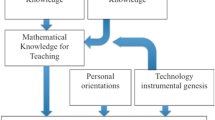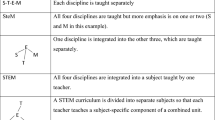Abstract
Recent research efforts (Schmidt et al. in The preparation gap: teacher education for middle school mathematics in six countries, MSU Center for Research in Mathematics and Science Education, 2007) demonstrate that teacher development programs in high-performing countries offer experiences that are designed to develop both mathematical knowledge and pedagogical knowledge. However, identifying the nature of the mathematical knowledge and the pedagogical content knowledge (PCK) required for effective teaching remains elusive (Ball et al. in J Teacher Educ 59:389–407, 2008). Building on the initial conceptual framework of Magnusson et al. (Examining pedagogical content knowledge, Kluwer, Dordrecht, pp 95–132, 1999), we examined the PCK development for two beginning middle and secondary mathematics teachers in an alternative certification program. The PCK development of these two individuals varied due to their focus on developing particular aspects of their PCK, with one individual focusing on assessment and student understanding, and the other individual focusing on curricular knowledge. Our findings indicate that these individuals privileged particular aspects of their knowledge, leading to differences in their PCK development. This study provides insight into the specific aspects of PCK that developed through the course of actual instructional practice, providing a lens for future research in this area.



Similar content being viewed by others
References
An, S., Kulm, G., & Wu, Z. (2004). The pedagogical content knowledge of middle school teachers in China and the U.S. Journal of Mathematics Teacher Education, 7, 145–172.
Ball, D. L., & Bass, H. (2003). Toward practice-based theory of mathematical knowledge for teaching. In B. Davis & E. Simmt (Eds.), Proceedings of the 2002 annual meeting of the Canadian Mathematics Education Study Group (pp. 3–14). Edmonton, AB: AMESG/GCEDM.
Ball, D. L., Thames, M. H., & Phelps, G. (2008). Content knowledge for teaching: What makes it special? Journal of Teacher Education, 59, 389–407.
Chval, K. (2008). Determining and responding to teacher professional development needs. Paper commissioned by Horizon Research, Inc. Available at: http://pdmathsci.net/reports/pi_memos/alm.pdf.
Even, R., & Tirosh, D. (1995). Subject-matter knowledge and knowledge about students as sources of teacher presentations of the subject matter. Educational Studies in Mathematics, 29, 1–20.
Hiebert, J., Wearne, D., & Tabor, S. (1991). Fourth graders’ gradual construction of decimal fractions during instruction using different physical representations. The Elementary School Journal, 91, 321–341.
Hill, H. C., Ball, D. L., & Shilling, S. G. (2008). Unpacking pedagogical content knowledge: Conceptualizing and measuring teachers’ topic-specific knowledge of students. Journal for Research in Mathematics Education, 39, 372–400.
Hill, H. C., Rowan, B., & Ball, D. L. (2005). Effects on teachers’ mathematical knowledge for teaching on student achievement. American Educational Research Journal, 42, 371–406.
Hill, H. C., Shilling, S. G., & Ball, D. L. (2004). Developing measures of teachers’ mathematics knowledge for teaching. The Elementary School Journal, 105(1), 11–30.
Horn, I. S., (2009, September). The development of pedagogical content knowledge in collaborative high school teacher communities. Paper presented at the psychology in mathematics education annual meeting, Atlanta, GA.
Kinach, B. M. (2002). A cognitive strategy for developing pedagogical content knowledge in the secondary mathematics methods course: Toward a model of effective practice. Teaching and Teacher Education, 18, 51–71.
Lappan, G., Fey, J. T., Fitzgerald, W. M., Friel, S. N., & Phillips, E. D. (2006). Connected mathematics series (2nd ed.). Boston, MA: Pearson Prentice Hall.
Magnusson, S., Krajcik, J., & Borko, H. (1999). Nature, sources and development of pedagogical content knowledge for science teaching. In J. Gess-Newsome & N. G. Lederman (Eds.), Examining pedagogical content knowledge (pp. 95–132). Dordrecht, The Netherlands: Kluwer.
Marks, R. (1990). Pedagogical content knowledge: From a mathematical case to a modified conception. Journal of Teacher Education, 41, 3–11.
McEwan, H., & Bull, B. (1991). The pedagogic nature of subject matter knowledge. American Educational Research Journal, 28, 316–334.
National Council of Teachers of Mathematics. (2000). Principles and standards for school mathematics. Reston, VA: National Council of Teachers of Mathematics.
NCATE. (2003). Programs for initial preparation of mathematics teachers: Standards for middle level mathematics teachers. Retrieved from http://www.ncate.org/LinkClick.aspx?fileticket=2rnqh%2bt9zhE%3d&tabid=676.
Philipp, R. A. (2007). Mathematics teachers’ beliefs and affect. In F. Lester (Ed.), Second handbook of research on mathematics teaching and learning. Reston, VA: National Council of Teachers of Mathematics.
Philipp, R. A., Ambrose, R., Lamb, L. C., Sowder, J. T., Schappelle, B. P., Sowder, L., et al. (2007). Effects of early field experiences on the mathematical content knowledge and beliefs of prospective elementary school teachers: An experimental study. Journal for Research in Mathematics Education, 38, 438–476.
Pirie, S. E. B. (1996). Classroom video-recording: When, why and how does it offer a valuable data source for qualitative research? (report no. SE-059-195). In Annual meeting of the north American chapter of the international group for the psychology of researching teacher knowledge 23 mathematics education, Columbus, OH (ERIC/CSMEE Document Reproduction Service No. ED 401 128).
Ponte, J. P., & Chapman, O. (2006). Mathematics teachers’ knowledge and practices. In A. Gutierrez & P. Boero (Eds.), Handbook of research on the psychology of mathematics education: Past, present and future (pp. 461–494). Rotterdam: Sense.
Rowan, B., Correnti, R., & Miller, R. J. (2002). What large-scale survey research tells us about teacher effects on student achievement: Insights from the Prospects Study of elementary schools. Teachers College Record, 104(8), 1525–1567.
Schempp, P. G. (1995). Learning on the job: An analysis of the acquisition of a teacher’s knowledge. Journal of Research and Development in Education, 28(4), 237–244.
Schmidt, W. H., et al. (2007) The preparation gap: Teacher education for middle school mathematics in six countries. MSU Center for Research in Mathematics and Science Education. Retrieved on May 24, 2011 at http://usteds.msu.edu/MT21Report.pdf.
Shulman, L. S. (1986). Those who understand: Knowledge growth in teaching. Educational Researcher, 15(2), 4–14.
Shulman, L. S. (1987). Knowledge and teaching. Harvard Educational Review, 57(1), 1–22.
Star, J. R. (2005). Reconceptualizing procedural knowledge. Journal for Research in Mathematics Education, 36(5), 404–411.
Stones, E. (1992). Quality teaching: A sample of cases. London and New York: Routledge.
Van Der Valk, T., & Broekman, H. (1999). The lesson preparation method: A way of investigating pre-service teachers’ pedagogical content knowledge. European Journal of Teacher Education, 22(1), 11–22.
Acknowledgments
This manuscript is based upon work supported by the National Science Foundation under grant ESI-0553929. Any opinions, findings, conclusions, and recommendations in this material are those of the authors and do not necessarily reflect the views of the National Science Foundation.
Author information
Authors and Affiliations
Corresponding author
Rights and permissions
About this article
Cite this article
Lannin, J.K., Webb, M., Chval, K. et al. The development of beginning mathematics teacher pedagogical content knowledge. J Math Teacher Educ 16, 403–426 (2013). https://doi.org/10.1007/s10857-013-9244-5
Published:
Issue Date:
DOI: https://doi.org/10.1007/s10857-013-9244-5




